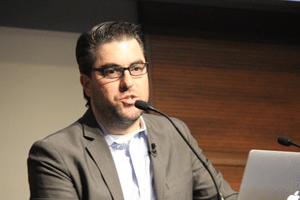
Every organization in law needs a data strategy, says Daniel Martin Katz.

The associate law professor at the Illinois Institute of Technology Chicago-Kent College of Law says law firms can be better predictors of their services if they capture and analyze their data.
“We care about data because we want to be able to predict things,” Katz told the Emerging Legal Technology Forum presented in partnership by Thomson Reuters and MaRS LegalX in Toronto Tuesday.
Doing things differently was top of mind at the conference, where lawyers, startups and legal tech enthusiasts came together to talk about how technology is changing the legal industry.
Katz said there can be a huge difference between what a legal process is and what a law firm thinks that process is — and data can help illuminate that gap.
“As you begin to collect data, you find out there are steps in this process you don’t even have reflected in your process,” Katz said.
Pursuing such strategies will likely have to be done in incremental steps, as partners will likely want to see a return on their investment before fully committing to the process. One step is creating a process map, in which all processes being carried out within a firm are identified, linked and logged.
Mapping out such processes can help firms become better predictors of risks, outcomes, how much certain types of litigation will cost and how long certain matters will take.
Data can also help in e-discovery and transactional work by predicting relevant documents and contract terms, Katz said.
All of this in the end allows firms to better express the value of their services to clients, he said.
“You can’t say how great your services are with no real measure of what you’ve actually accomplished. It doesn’t work,” Katz told the audience.
The conference also featured a panel discussing legal analytics systems that are mining data both inside and outside of firms. Startups and companies that are mining legal data outside of firms seek to provide accessible statistics to clients based on math and the vast amount of unstructured legal data that exists.
Toby Unwin, chief innovation officer at Premonition LLC, said the transparency such services can provide will have a big impact on the legal industry.
Premonition is a Florida-based company that mines the data in legal documents in order to rate lawyers based on factors that include outcomes and the length of trials.
Unwin noted that lawyers belong to one of few professions where the less efficient you are, the more you get paid. He added this might be a reason that legal tech has not moved forward as fast as other technological sectors have.
He said that some firms also bluff about what their success rates are, but services like the ones his company provides can change these things.
“Every great change will come from transparency,” he said.